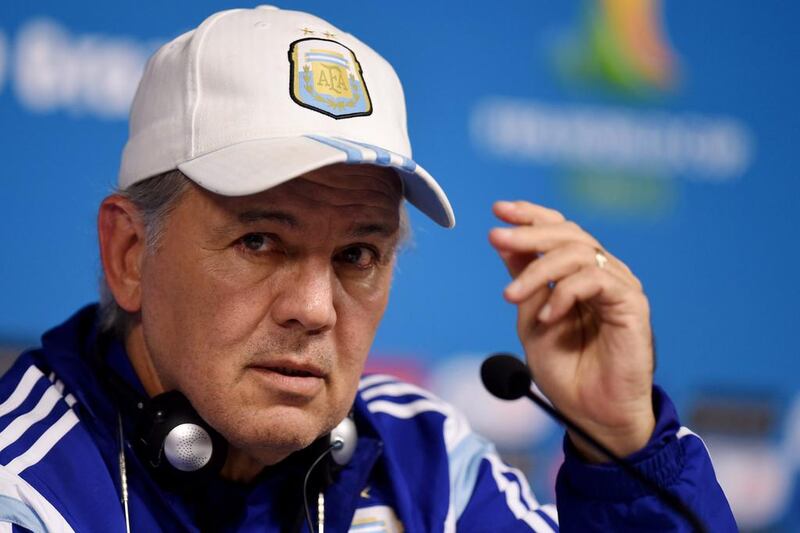Argentina’s run to the final of the 2014 World Cup may never have happened had it not been for the good graces of Arabian Gulf League club Al Jazira.
In May 2011, the Brazilian, Abel Braga, announced he would leave Al Jazira after he had just led the club to their first UAE league title, which prompted officials to approach Alejandro Sabella to take over.
The former Estudiantes manager, then 56, flew to the UAE and spent two weeks in Abu Dhabi.
He attended a couple of matches as Jazira won the President’s Cup to complete a double and end Braga’s three-year tenure in style.
On June 10, Sabella signed a one-year deal to coach at the Mohammed bin Zayed stadium. The Argentine returned home and planned to be back in the UAE in July to begin training for the 2011/12 season.
Then his country came calling.
After Argentina’s poor performance at the 2011 Copa America, where they were knocked out in the quarter-finals by Uruguay, Sergio Batista stepped down as manager and Sabella was offered the job.
He delayed his planned July flight to the UAE and began negotiations for what he described as “one of the biggest jobs in football”.
Jazira allowed Sabella to renege on his contract and, with their blessing, his appointment as the new manager of Argentina was confirmed on August 2, 2011.
At the time, Sheikh Hamdan bin Zayed, Jazira's Honorary Chairman, said the club "respected" Sabella's decision and they did not even ask for compensation
“Sabella was given the opportunity to manage his country and we, as a club, must respect and understand his decision,” said a club spokesman. “We wish him well with Argentina.
“This is, after all, one of the best teams in international football with Lionel Messi, the best player in the world, so it’s not as if Sabella turned us down for a small club.
“It says a lot for Al Jazira’s ambition that we appointed a man who is deemed good enough to coach such a powerful football nation.
“He has gone to something bigger and better, so we are philosophical about the past weeks’ events.”
[ Read more: Al Jazira new signing Mirko Vucinic already ‘feels right at home’ ]
Saleh Basheer, the Jazira centre-back who moved to Sharjah, had some good memories of Sabella, who on Sunday night leads Argentina into the World Cup final against Germany.
While he was in Abu Dhabi, club management arranged a boat trip for Sabella and the players to get to know each other.
“From the little time I spent with Sabella, I can only say he was completely different from Braga in many ways,” Basheer said.
“To start with, Braga didn’t want to listen to the players, instead he wanted the players to listen to him. Braga had an autocratic attitude but Sabella seemed different and he gave the impression as a kind and gentle person.
“It is hard to speak of a person whom you meet only once and never got to work under him. But he gave a good feeling to us. He wanted to know the opinions of the players and was keen in listening to what we had to say.
“It was a pity we didn’t get a chance to work under him as he became the coach of Argentina. Having taken the team to the final now I feel he made a good decision. I can only send him my silent good wishes.”
Nobody can blame Sabella for choosing country over club, said Abdulla Qasem, the Jazira midfielder.
“What can we say? I don’t know how difficult it was for Sabella to arrive at a decision at that time but he chose the right one. Argentina are in the final,” said Qasem
Jazira have had six different managers since: Franky Vercauteren (Belgium), Caio Junior and Paulo Bonamigo (both from Brazil), Luis Milla (Spain) and Walter Zenga (Italy). Eric Gerets (Belgium) was unveiled as the new coach this summer. The 2010/11 title remains Jazira's last.
“I wouldn’t know exactly what we would have achieved had Sabella decided to remain at Jazira,” said Qasem.
“To play in the World Cup, leave aside winning it, is the dream of every player and I may even say every coach. So the prospect of taking Argentina to the World Cup was a bigger objective for Sabella.”
apassela@thenational.ae
Follow us on Twitter at @SprtNationalUAE






